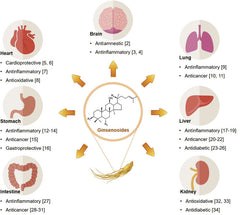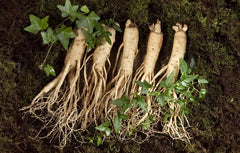Ginseng is a popular herbal remedy known for its medicinal properties, widely used in traditional medicine, especially in East Asia. Here are some key points about ginseng:

Types of Ginseng
-
Asian Ginseng (Panax ginseng):
- Found in Korea, China, and Siberia.
- Often used to boost energy, reduce stress, and improve overall health.
-
American Ginseng (Panax quinquefolius):
- Grown mainly in North America.
- Known for its calming effects and is believed to boost the immune system.
-
Siberian Ginseng (Eleutherococcus senticosus):
- Not a true ginseng but has similar adaptogenic properties.
- Used to enhance physical performance and stamina.
Key Components
- Ginsenosides: Active compounds in ginseng that contribute to its health benefits.
- Polysaccharides: Complex sugars that support immune function and overall health.
Health Benefits
- Energy and Stamina: Ginseng is often used to combat fatigue and improve physical performance.
- Cognitive Function: May enhance mental performance, concentration, and memory.
- Stress Reduction: Known for its adaptogenic properties, helping the body manage stress.
- Immune Support: Can strengthen the immune system and improve overall health.
- Antioxidant Properties: Helps reduce inflammation and protect against cellular damage.
Uses in Traditional Medicine
- Herbal Tea: Ginseng roots are often brewed into tea.
- Supplements: Available in various forms such as capsules, powders, and extracts.
- Culinary Uses: Sometimes added to soups and other dishes for its health benefits.
Considerations
- Dosage: It's important to use the appropriate dosage to avoid side effects.
- Consultation: Always consult with a healthcare professional before starting any new supplement, especially for those with existing health conditions or those taking other medications.
Ginseng is a versatile and potent herb with a long history of use in promoting health and well-being




